'Herpes is curing my skin cancer'
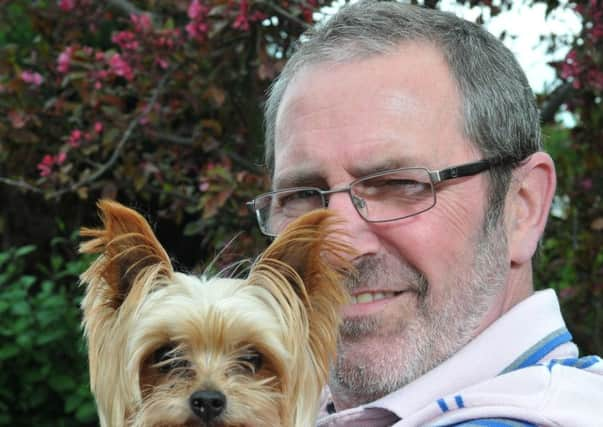

When Dave Fairclough was a child, people were unaware of the true risk of sunbathing and often didn’t put on suncream or apply it regularly enough.
Dave can vividly remember going on holiday with his parents to Abersoch in Wales when he was about eight and getting severely sunburnt.
Advertisement
Hide AdAdvertisement
Hide AdDave, who has always had a mole on his left arm, says doctors say the severe bout of sunburn all those years ago may be the reason why the mole turned cancerous decades later.
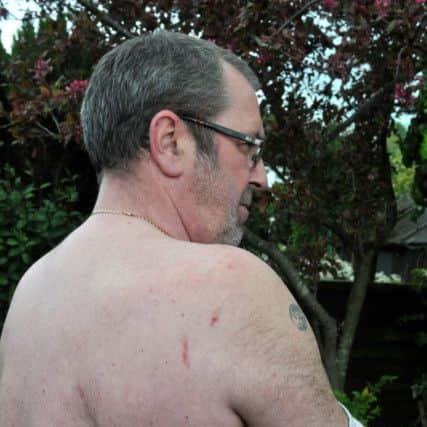

Dave, 57, who is married to Joanne and lives in Burscough, says: “Doctors say my skin cancer could have been caused by a bad case of sunburn as a little lad.
“I do recall getting severely sunburnt when I was on that holiday in Wales.
“Back then, people did not use suncream as much or put it on as often or as thoroughly as they did not know the dangers.
Advertisement
Hide AdAdvertisement
Hide Ad“Doctors do not know for definite but one theory is that this sunburn as a child caused skin cancer years down the line.”
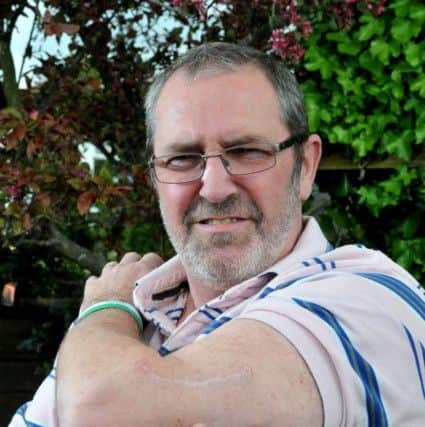

Dave, a father-of-three and a granddad who is self employed with a window installation and refurbishment company, first noticed something was amiss around July 2011 when the mole on his arm suddenly started to itch.
Dave says: “I just noticed that my mole itched. But it wasn’t very severe itching so I did not take much notice.
“Over a period of a couple of months, I noticed that the mole had become a bit wider and was a bit higher. Instead of being flat on the skin, it was slightly raised. The mole had always been soft but it felt hard. My wife noticed me itching and told me I should get it checked out. But I didn’t take any notice at first and was busy with work and playing cricket and golf and convinced myself I did not have time to go to the doctors.”
Advertisement
Hide AdAdvertisement
Hide AdDave’s wife plays the piano for a male voice choir and the couple went for a weekend to Cheltenhelm as the choir were singing in a few concerts.
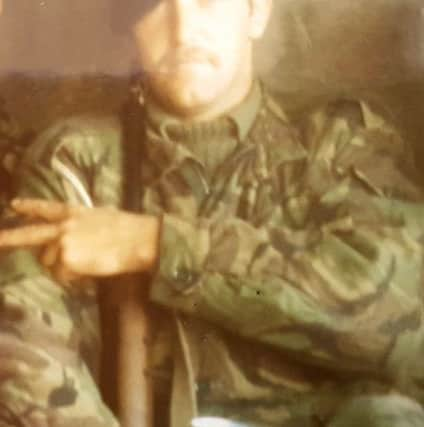

One of the members of the choir was a doctor and Dave’s wife urged Dave to show him the mole.
Dave says: “He looked at it and said: ‘If I were you, I would get that checked out.’”
It was the push Dave needed and on his return home, he went to A&E and was transferred to Southport Hospital.
Advertisement
Hide AdAdvertisement
Hide AdIt was arranged for Dave to go into hospital to have a minor operation to remove the mole using local anaesthetic. A biopsy was carried out which came back positive for skin cancer.
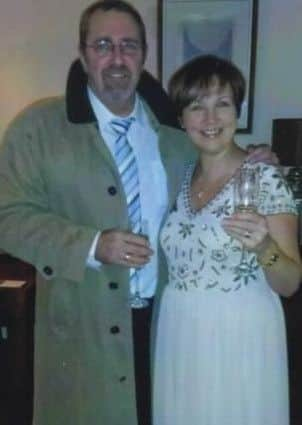

Dave faced a bigger operation at Whiston Hospital in Prescot under general anaesthetic to get rid of the surrounding tissue in case the cancer had spread.
His lymph nodes were checked and when one was found to have cancer, he had to go into hospital again for a major operation to remove virtually all his lymph nodes.
Dave explains: “By this point, it was mid 2012 and they opened up under my arm and armpit and took out virtually all the lymph nodes. They took a muscle out from under my left pectoral muscle and inserted it under my arm to rebuild my armpit.”
Advertisement
Hide AdAdvertisement
Hide AdDave went for regular check-ups and was urged to keep inspecting himself and to alert them whenever he spotted a lump.
Over the next couple of years, Dave underwent around 10 operations to remove lumps and tumours that appeared on the back of his left arm.
He then went for a PET scan which revealed a tumour behind his left collar bone. As a result, he had to have surgery which a consultant told him they had never done before.


Dave says: “To get to the tumour, they had to open my shoulder up, cut my collar bone in half and open it up like London Bridge.
Advertisement
Hide AdAdvertisement
Hide Ad“They then went in and the tumour was about an inch-and-a-half into my chest and was about 18mm wide. After removing the tumour, they put a titanium plate into my collar bone.”
Two years after that, Dave went for another check-up which showed a tumour on the bottom half of his right lung.
Dave went to Broadgreen Hospital in Liverpool for a major operation to have part of his lung removed.
After recovering from this, Dave carried on with regular check-ups and a year ago, he found another lump on the inside of his left arm.
Advertisement
Hide AdAdvertisement
Hide AdDave says: “It was then that the oncologist told me about a skin cancer trial being run at Clatterbridge Cancer Centre. He said he couldn’t keep chopping bits out of me as there would be nothing left of my arm.”
Dave found out more about the skin cancer trial and decided that he should go for it. He explains: “I realised that this was a chance of a cure and unless I went for it, I would never know.
“The risk was that it would not work at all and the tumours would be growing in my body and by that time it may be too later. But after weighing it up, I decided to take part in the trial.”
Scientists at The Clatterbridge Cancer Centre are using the modified cold sore virus herpes in skin cancer research. The hospital in Merseyside is one of the top recruiters for an international trial using the genetically modified version of herpes on skin cancer patients. The therapy could lengthen the life expectancy of some sufferers by years.
Advertisement
Hide AdAdvertisement
Hide AdCalled T-VEC, it is injected directly into the tumours and releases substances to help fight cancer. Crucially, it is not harmful to normal cells.
T-VEC has now been given interim funding from the Cancer Drugs Fund under strict guidelines. The researchers at The Clatterbridge Cancer Centre in Wirral, are hoping to learn more about exactly the type of patients who will benefit most from the drug.
Dr Joseph Sacco, consultant in medical oncology and local investigator for the trial, says: “This stage of the trial has been about understanding more about how treatment works in patients, both locally in injected lesions and through the stimulation of the immune system.
“Ultimately, we hope the research will help us identify which patients are most likely to benefit, helping us choose which patients to offer T-VEC to, minimising side effects while maximising treatment. We want to understand better exactly where to use it.
Advertisement
Hide AdAdvertisement
Hide Ad“T-VEC is a good new option for people with melanoma as it has low toxicity.
“It is exciting to see it changing outcomes, heralding a new class of drugs becoming available to use as a single agent, or with other treatments.”
The findings from The Clatterbridge Cancer Centre will now be examined, along with those from a number of centres around the world.
Dave started the trial 10 months ago and is one of just three patients undergoing it at Clatterbridge Cancer Centre.
Advertisement
Hide AdAdvertisement
Hide AdHe says: “Medics inject the tumours with a genetically modified herpes.
“The way I understand it is the cancer is there as the body’s defence mechanism does not recognise it as an enemy so it does not attack it. What this herpes virus does is attach itself to the cancer and the body recognises it as something to fight.
“Your immune system then goes into overdrive to fight the virus that has been injected into you and at the same time, it is destroying the cancer cells.”
For the first couple of months of the trial, Dave’s tumours carried on growing, but they then stopped growing and have been stable for six months.
Advertisement
Hide AdAdvertisement
Hide AdThen a month ago, results showed that two of the tumours had reduced by about 10 per cent.
Dave says: “As long as the tumours are stable or shrinking, I will keep having the injections. The hope is that they will eventually disappear.”
Dave says all the staff at Clatterbridge Cancer Centre have been fantastic and very supportive.
He says: “All the staff are brilliant and are always so positive. It feels great to not have to keep going in for operations to have bits taken out of your arm and chest.
Advertisement
Hide AdAdvertisement
Hide Ad“It had got to the stage where I had started getting used to being operated on. But now the thought of that is the last thing I want.”
Dave is using his own experience to warn people of the risks of the sun and to ensure they are properly protected with suncream.
As well as his case of sunburn as a child, Dave admits he loved sunbathing through his teens, 20s and 30s.
Dave says: “I used to put suncream on but possibly I may not have put on enough or applied it as often as I should. I would urge people to put suncream on as getting sunburnt could lead to repercussions years later.
Advertisement
Hide AdAdvertisement
Hide Ad“People do not always put suncream on in the UK as they think it is just something you need abroad. But you need to put it on all the time. Now I stay in the shade as much as possible.”
Dave gets some good-natured teasing from his friends about the fact he is effectively injecting himself with herpes to try to cure his cancer.
Dave says: “They make jokes about not wanting to hug or kiss me!
“But as long as it keeps working, I am going to keep having the injections and hopefully it will eventually get rid of the tumours.”
STAY SAFE IN THE SUN
Advertisement
Hide AdAdvertisement
Hide AdJoanne Upton, lead chemotherapy and skin cancer advanced nurse practitioner at The Clatterbridge Cancer Centre, gives her advice on staying safe in the sun:
“The main cause of any form of skin cancer is over exposure to the sun, or UV radiation, so the best advice we can give is to cover up as best possible in the sun – using high-factor sun creams and wearing wide-brimmed hats to avoid over-exposure to the face.
“Also, we’d suggest people stay away from sun beds as the UV radiation can damage the skin and lead to skin cancer.
“Other key pieces of advice would be to try and stay out of the sun at the hottest time of the day – between 11am and 3pm – and to wear sunglasses with UV protection to avoid damaging the eyes.
Advertisement
Hide AdAdvertisement
Hide Ad“It’s also important to keep children safe in the sun and educating them at a young age of the dangers of over-exposure to the sun will hopefully keep them healthy in later life.
“Teachers are no longer able to apply sun cream in the playground on a hot day so sending children to school fully prepared and understanding the importance of sun protection will help keep them safe. One common misconception is that it’s only people with fair skin who are prone to burning in the sun are at risk from skin cancer.
“Although it is more common in people with pale skin and blonde or red hair, that does not mean olive-skinned people are immune to the dangers of the sun.
“As well as contributing to skin cancer, the sun can also cause us to age prematurely, which will affect everyone, so keeping the face protected as much as possible is very important.”